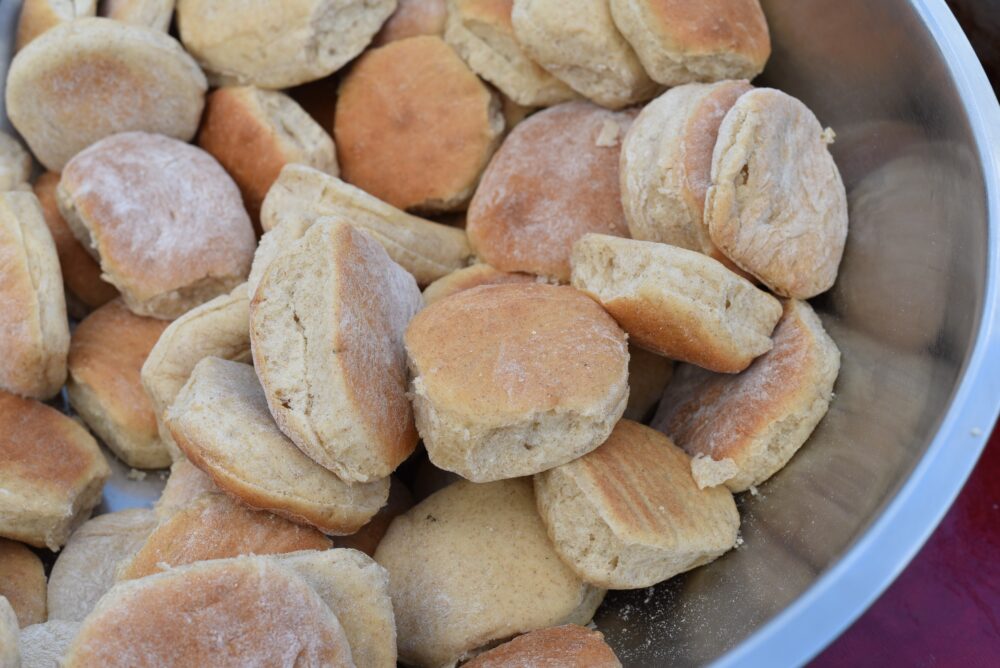
An endless banquet of grace.
Saturday lunch at Madonna House tends to be a medley of dishes that some of us have taken to calling “the week in review.” The kitchen staff have a strong motivation to clear out the cooler at the end of the week, so we tend to have little bits and pieces of — oh, Thursday supper and Friday lunch, Wednesday lunch and so forth, all combined in various creative ways.
Since our cooks are good cooks, the resulting meal is good, and we are happy to do them the favor of eating up the leftovers to make room on the shelves for the next bunch of — well, leftovers to be.
Of course, leftovers have a shelf life, and at a certain point of kitchen management it goes to the chickens, who are kind enough to eat it up and give it back to us in the form of farm-fresh eggs.
Now why, you might ask, am I going on about leftovers in what is supposed to be a column on the Sunday Mass readings? Where am I going with this?
Well, I am going to the Sunday in late June this year, the Solemnity of the Body and Blood of Jesus Christ. And I got onto the subject of leftovers by way of the Gospel for this Sunday, Luke 9: 11-17. It is the Gospel of the multiplication of the loaves and fish, and at the end of it there is this wonderful verse, What was left over was gathered up, twelve baskets of broken pieces.
Jesus had leftovers, in other words! And while this is a nice and rather homey little domestic detail to the story, there’s really a lot more going on here than that.
For starters, the number twelve has profound meaning in biblical symbolism, signifying perfection, completion, fullness. In other words, Jesus indeed had leftovers, but those leftovers are such a complete meal that you and I and the whole world have been feeding on them for the last 2000 years.
This is the difference between the leftovers in your kitchen and those in God’s pantry. Our human leftovers are finite, and can only be served for a short time before they turn into chickenfeed, unfit for human consumption.
God, on the other hand, has laid a table for humanity that is so abundant and imperishable and has stocked it with goods whose food value is so beyond even the best superfoods the health food store can provide, that they suffice for all human nourishment until the end of time.
Jesus fed the 5000 a satisfying meal with a single miracle, an astonishing thing for sure, something to marvel at and rejoice over. But he feeds the 5 billion, the 5 trillion even, if the world should go on so long, with a meal that goes on and on and on and never runs out.
We have been eating the Body and Blood of Jesus Christ, for 2000 years in our Church, entrusted to the apostles and their baskets, so to speak (that is, the visible concrete structures of the Church), after his resurrection and ascension into heaven. This strange and wondrous reality that has been passed on to us from them, as St. Paul faithfully recounts in the second reading for this Sunday (1 Cor 11:23-26), where his self-offering unto death on Calvary, the sacrifice on the Cross, is made a living and present reality—the Sacrifice of the Mass here and now.
All human food perishes in time. The best, the most lovingly and skillfully prepared, the most scrumptious, nutritious, farm-fresh-and-cooked-to-perfection banquet… well, it’s good, isn’t it! Good as it comes forth from the oven, piping hot and ready for service. Good the next day, reheated. Maybe still OK the day after that… and then onto the compost pile with it, or into the chicken coop.
It nourished our bodies and delighted our soul at the moment itself, but no matter what, we have to eat again tomorrow. All our human food is like that—good at the moment, and what we need, but then it’s gone and over, and even the leftovers are only for the time.
God’s food is different. Jesus laid a table for his disciples 2000 years ago, and we are still feeding at that table. The difference is not just in scale or in quality, but in kind—it’s a whole other kind of meal the Lord is providing us with here.
Human food, besides being yummy and satisfying, gives us strength to do human work, to do the normal kinds of activity that are part of our human life, and to maintain ourselves bodily as the kind of beings we are—animals of the genus and species homo sapiens.
God’s food gives us quite a different strength—the strength to love as Jesus loves, to live as Jesus lives. And it maintains us as quite a different kind of being—the human person redeemed, the human person divinized by the constant infusion of divine grace and life.
And all this is going on day in and day out, at this little parish or that little chapel, in that giant cathedral or in that hidden, cloistered monastery, the everyday, ordinary life of the Catholic Church extended through time and space. Fr. So-and-So may celebrate the Mass poorly or well, with care, reverence, and attention to the rubrics or maybe not so much. At the most basic level, it doesn’t matter. We receive that which God gave to his Church, namely, his love and grace poured out in an endless banquet of grace.
It is the food of God, food for the body made into the very divine life of the soul. The Word made flesh, indeed, and we celebrate it in a particular way on this Solemnity.




